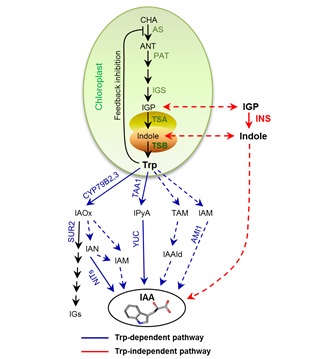The phytohormone auxin regulates nearly all aspects of plant growth and development. Dynamic auxin gradients, which are mainly regulated by local auxin synthesis, catabolism, conjugation, and polar auxin transport, are essential for the integration of various environmental and endogenous signals. Indole-3-acetic acid (IAA), the naturally occurring major species of auxins in plants, can be synthesized through the precursor tryptophan (Trp) known as the Trp-dependent IAA biosynthetic pathway. However, IAA may also be synthesized through a proposed Trp-independent IAA biosynthetic pathway. Although the Trp-independent IAA biosynthesis was hypothesized 20 years ago, its biological functions and its molecular basis have remained a mystery for decades.
The group of Prof. LI Jiayang from the Institute of Genetics and Developmental Biology, Chinese Academy of Science, has long-term interests in the Trp-independent IAA biosynthetic pathway in
Arabidopsis. They found that indole-3-glycerol phosphate (IGP) in the Trp biosynthetic pathway served as a
branch-point compound in the Trp-independent IAA biosynthetic pathway (Ouyang et al., Plant J, 24: 327, 2000). Further studies suggested that a cytosol-localized indole synthase (INS) might be involved in the Trp-independent biosynthesis of indole-containing metabolite (Zhang et al., JIPB, 50: 1070, 2008).
In a recent study, they have provided convincing evidence to reveal the crucial role of INS in the Trp-independent auxin biosynthetic pathway that is essential for embryogenesis. During early embryogenesis, the ins-1 mutant exhibits the arrested embryo development with normal apical-basal polarity or irregular cell division planes. Compared to wild type, the free IAA content in ovules of ins-1 decreased significantly. Consistent with its critical role during embryogenesis, INS shows specific spatial and temporal expression patterns in embryos. These results demonstrated that the Trp-independent IAA biosynthetic pathway contributes significantly to the establishment of apical-basal axis, which directly regulates early embryogenesis in Arabidopsis.
This work provides compelling evidence demonstrating that the cytosol-localized INS initiates the Trp-independent IAA biosynthesis that regulates embryogenesis in higher plants. These discoveries pave an avenue for elucidating the Trp-independent auxin biosynthetic pathway and its functions in regulating plant growth and development, thereby making a solid conclusion on a long-lasting debate in auxin biology.
This work has been published online in Proc Natl Acad Sci USA on March 23, 2015 (DOI:10.1073/pnas.1503998112), with Drs. WANG Bing, CHU Jinfang and YU Tianying as the co-first authors. This research was supported by National Natural Science Foundation of China.

Figure. A model of the Trp-dependent and Trp-independent IAA biosynthetic pathways.
Solid arrows refer to pathways with identified enzymes and dashed arrows to undefined ones. (Image by IGDB)
AUTHOR CONTACT:
Dr. LI Jiayang
Institute of Genetics and Developmental Biology, Chinese Academy of Sciences, Beijing, China.
 Figure. A model of the Trp-dependent and Trp-independent IAA biosynthetic pathways.Solid arrows refer to pathways with identified enzymes and dashed arrows to undefined ones. (Image by IGDB)AUTHOR CONTACT:Dr. LI JiayangInstitute of Genetics and Developmental Biology, Chinese Academy of Sciences, Beijing, China.E-mail: jyli@genetics.ac.cn
Figure. A model of the Trp-dependent and Trp-independent IAA biosynthetic pathways.Solid arrows refer to pathways with identified enzymes and dashed arrows to undefined ones. (Image by IGDB)AUTHOR CONTACT:Dr. LI JiayangInstitute of Genetics and Developmental Biology, Chinese Academy of Sciences, Beijing, China.E-mail: jyli@genetics.ac.cn CAS
CAS
 中文
中文




.png)
